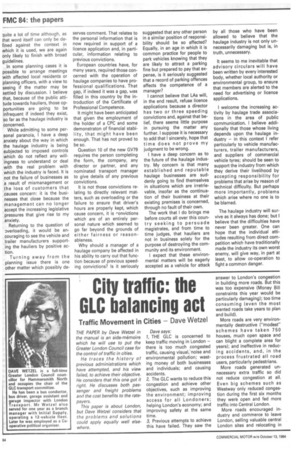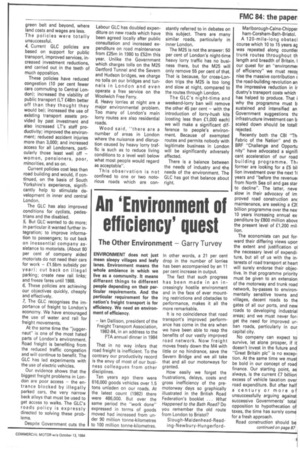City traffic: the GLC balancing act
Page 86

Page 87

If you've noticed an error in this article please click here to report it so we can fix it.
Traffic Movement in Cities — Dave Wetzel
THE PAPER by Dave Wetzel in the manual is an aide-mornoire which he will use to put the Greater London Council case for the control of traffic in cities.
He traces the history of previous administrations which have attempted, and his view failed, to achieve their objective. He considers that this one got it right. He discusses both passenger and freight problems and the cost benefits to the ratepayers.
This paper is about London, but Dave Wetzel considers that the problems and solutions could apply equally well elsewhere. Dave says: 1, THE GLC is concerned to keep traffic moving in London — there is too much congested traffic, causing visual,'noise and environmental pollution; wasting money of both businesses and individuals; and causing accidents.
2, The GLC wants to reduce this congestion and achieve other objectives, such as improving the environment; improving access for all Londoners; helping London's economy; and improving safety at the same time.
3, Previous attempts to achieve this have failed. They saw the answer to London's congestion in building more roads. But this was too expensive (Money Bill constraints this year would be particularly damaging); too time consuming (even the most wanted roads take years to plan and build).
More roads are very environmentally destructive ("modest" schemes have taken 750 houses, much open space and can blight a complete area for years); and ineffective in reducing accidents, and, in the process frustrated all road users, particularly pedestrians.
More roads generated unnecessary extra traffic so did not reduce congestion at all. Even big schemes such as Westway only reduced congestion during the first six months they were open and fed more traffic into Central London.
More roads encouraged industry and commerce to leave London, selling valuable central London sites and relocating in green belt and beyond, where land costs and wages are less. The policies were totally unsuccessful.
4, Current GLC policies are based on support for public transport, improved services, increased investment reductions, and carried out in the teeth of much opposition.
These policies have reduced congestion (10 per cent fewer cars commuting to Central London); increased the viability of public transport (LT £48m better off than they thought they would be); increased the use of existing transport assets provided by past investment and also increased LT's staff productivity; improved the environment; reduced accident injuries more than 3,000; and increased access for all Londoners, particularly those least well off — women, pensioners, poor, minorities, and so on.
Current policies cost less than road building and would, if continued, on the basis of South Yorkshire's experience, significantly help to stimulate development in inner and central London.
The GLC has also improved conditions for cyclists, pedestrians and the disabled.
5, But GLC wanted to do more; in particular it wanted further integration; to improve information to passengers; to cut back on inessential company assistance to motorists. (About 80 per cent of company aided motorists do not need their cars for work — £1.5bm subsidy per year); cut back on illegal parking; create new rail links; and freeze fares until 1988.
6, These policies are achieving our objectives quickly, cheaply and effectively.
7, The GLC recognises the importance of freight to London's economy. We have encouraged the use of water and rail for freight movements.
At the same time the "juggernaut" is one of the most hated parts of London's environment. Road freight is benefiting from the reduced traffic congestion and will continue to benefit. The GLC has led experiments with the use of electric vehicles.
Our evidence shows that the biggest freight problems in London are poor access — the entrance blocked by illegally parked cars, the very narrow back alleys that must be used to get access to walks. The GLC's roads policy is expressly directed to solving these problems.
Despite Government cuts the Labour GLC has doubled expenditure on new roads which have been agreed locally after public consultation and increased expenditure on road maintenance from £25m in 1980 to £52m this year. Unlike the Government which charges tolls on the M25 Dartford Tunnel and the Severn and Hudson bridges, we charge no tolls on our bridges and tunnels in London and even operate a free service on the Woolwich Free Ferry.
8, Heavy lorries at night are a major environmental problem. Too many of London's main lorry routes are also residential roads.
Wood said, "there are a number of areas in London where the nuisance and disruption caused by heavy lorry traffic is such as to reduce living conditions to a level well below what most people would regard as acceptable".
This observation is not confined to one or two notorious roads which are con stantly referred to in debates on this subject. There are many similar roads, particularly in inner London.
The M25 is not the answer: 50 per cent of London's night-time heavy lorry traffic has no business there, but the M25 will only remove 55 per cent of that. That is because, for cross-London trips the M25 is too long and slow at night, compared to the routes through London.
The GLCrs night-time and weekend-lorry ban will remove the other 45 per cent — with the introduction of lorry-hush kits (costing less than £1,000 each) we will make a significant difference to people's environment. Because of exempted routes and permits nobody with legitimate business in London will be significantly adversely affected.
There is a balance between the needs of industry and .the needs of the environment. The GLC has got that balance about right.
















































































































































